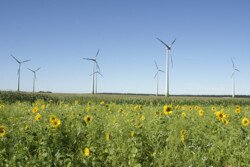
On February 14, 1992, 14 pioneers founded the Biogas Association at the Holz family's Karlshof farm in the Rems-Murr district of Baden-Württemberg. This happened at a time when there were just under 140 biogas plants in Germany, most of them built by organic farmers themselves with the aim of refining the slurry produced on the farm into high-quality fertilizer.
Thirty years later, more than 9,500 biogas plants produce around 100 terawatt hours of gas per year, equivalent to one-tenth of Germany's gas consumption. This is used to generate electricity and heat, as fuel or in thermal baths.
The path of biogas use in Germany has not always been straight or easy, recalls Dr. Claudius da Costa Gomez, chief executive of the German Biogas Association, who has been in office for 22 years.
"With the entry into force of the Renewable Energy Sources Act (EEG) in April 2000, the right course was set - however, over the years, new barriers and detour were added," says the biogas expert. For example, the introduction of the NawaRo bonus in 2004, which was intended to provide a financial incentive for the use of renewable raw materials - i.e. energy crops - had a very positive effect on the development of the industry. Combined with the slurry bonus from the EEG 2009, a real construction boom followed - with all the associated consequences. "When a lot is built very quickly, it sometimes doesn't happen with the necessary sense of proportion," says da Costa Gomez, describing the situation at the time.
The result was virtually a full stop by politicians with the amendment to the EEG in 2014, which aimed to limit the cultivation of corn, but sent the entire industry into a kind of slumber. "For the last ten years, we've been fighting for survival, and new plant construction in Germany has come to a virtual standstill." Constant new licensing requirements made operating the plants increasingly unattractive. Only the addition of flexible capacity and the new construction of small slurry plants generated noteworthy sales for biogas companies in the domestic market.
"Just in time for our milestone birthday, however, we are once again optimistic about the future," da Costa Gomez is pleased to report. The importance of biogas plants in providing storable renewable energy is being recognized, he said. "Flexible biogas plants are an elementary support for the fluctuating power supply from wind and solar power plants, which as "workhorses of the energy turnaround" provide the majority of the required energy," explains the CEO.
As reliable reserve energy, biogas plants already significantly reduce the price of electricity on the stock exchange by preventing the operation of expensive downstream power plants. In addition, biogas in the form of Bio-CNG (compressed natural gas) and Bio-LNG (liquefied natural gas) is increasingly in demand as a fuel for heavy-duty transport. By cultivating species-rich energy crops, biogas also improves biodiversity in fields; and waste heat from power generation supplies entire bioenergy villages - climate-friendly, reliable, cost-effective.
"The biogas bouquet is and will remain colorful and versatile. We are looking positively to the future and look forward to the next 30 years of doing our part to transform the nuclear-fossil energy supply into a 100% renewable-climate-neutral energy economy," says the chief executive.
Text: Fachverband Biogas e.V.
Translated with www.DeepL.com/Translator (free version)












